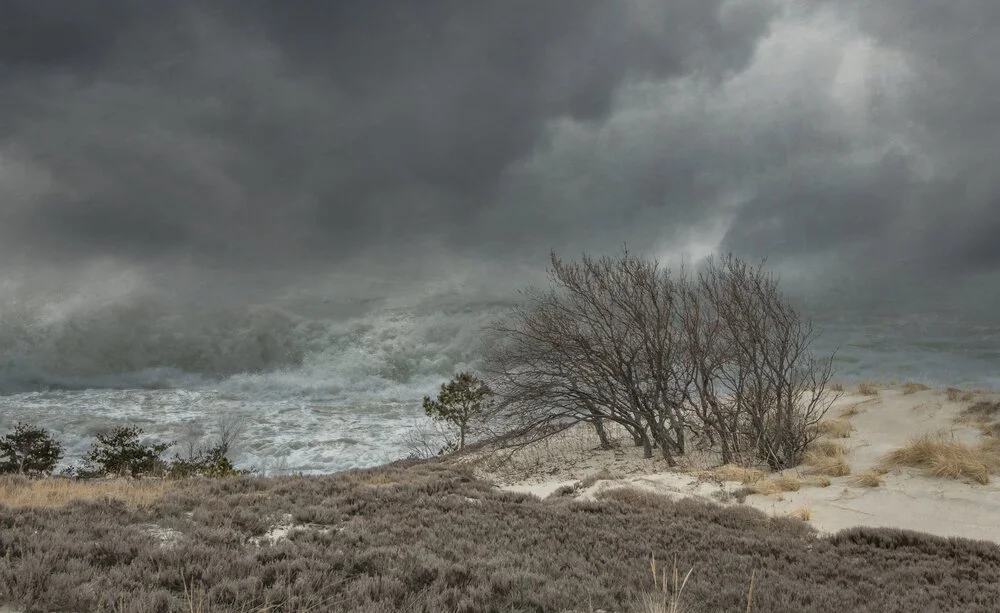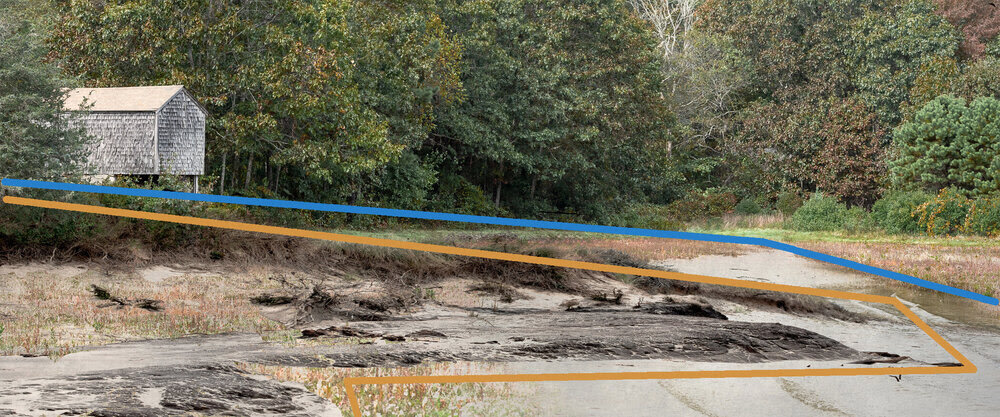
As the sea rises
“Crane Beach Gloucester MA’’ (archival pigment print), by Newton, Mass.-based photographer Vicki McKenna, at Fountain Street Fine Art Gallery, Boston.
The gallery says:
“Capturing photos of simplicity, subtlety, and serenity, Vicki McKenna’s work transmits a genuine sense of place. Her curiosity about natural landscapes stems from her background in geology, and her interest in architecture leads her to photograph the built environment. Working in both color and black and white she uses techniques that range from modern archival inks to traditional platinum/palladium prints
“In her current project McKenna creates images that are meant as harbingers from the future. They present the intertwining of ocean and shore environments as sea level rises. Her selection of locations to photograph is informed by, but not limited by, maps of projected sea level rise of 6 feet, a possibility by 2100. The mapping is visualized online by the National Oceanic and Atmospheric Administration. …
“After earning a PhD in Geological Sciences from Brown University and ALB in Natural Sciences from Harvard University, McKenna studied photography at the New England School of Photography and the Photography Atelier at the Griffin Museum. She has had juried solo shows at the Firehouse Center for the Arts, Newburyport and the Newton Free Library, and has exhibited extensively throughout New England and along the East Coast….’’
Metaphors for climate change
See Vicki McKenna’s show “Geology and the Physical World,’’ at Fountain Street Fine Art, Boston. Sadly, the show closes Oct. 25.
She says:
“Trained as a geologist, I see rocks as telling a story if you know how to interpret them. Photographs also require interpretation for they are the ingredients of a story rather than the story itself. The viewer assembles them into a narrative that is personally important.
“My works are photo illustrations that combine multiple photographs and are intended to collapse present and future into one image. All my previous work has been straight photography. I’ve captured an image in the camera, edited, and printed it. My use, here, of editing software to create a composite image is a departure that seemed justified by the challenge of incorporating the element of time into the final image.
“I was motivated by considering the effects of rising sea level. Each image is a montage of two or more photographs. I have merged one photograph representing the current environment with other photographs representing a possible future. The composite image isn’t meant to be a scientific thesis, but a metaphor for a possible result of climate change. In some images it is easy to identify the elements of the individual photographs. In others, the blending of photographs creates an image that almost seems realistic. The ambiguities of scale and detail in the montage are intended to create a sense of discontinuity or unease.’’
See:
https://www.fsfaboston.com/growingagallery/2020/10/23/geology-and-the-physical-world-vicki-mckenna?mc_cid=37b6bc98f3&mc_eid=296ccbd81d
New Bedford, Mass.
Pictures of the shifting
Left: "Fragnet” (oil and graphite powder on canvas), by Kathline Carr; right: “Crane Beach” (photo), by Vicki McKenna, in their show together “Geographies of a Shifting World,’’ at Fountain Street Fine Art, Boston, through Oct. 25
The gallery says:
The two “share an interest in elemental landforms and geological processes. Carr’s drawings, paintings, and monotypes are in conversation with McKenna’s photography-based prints. They implicitly share an interest in human interaction with the natural world. Their current work has a common focus of climate change. Carr utilizes multiples and repetitious mark-making allowing patterns, gestures, and forms to represent her feelings of despair and hopelessness about current climate. McKenna’s photo illustrations combine multiple images intended to collapse present and future into one image that suggests the result of sea-level rise.’’
Panorama of Crane Beach in September 2007
— Photo by Thomas Steiner
Crane Beach is a gorgeous 1,234-acre state-owned conservation and recreation property in Ipswich, Mass., just north of Cape Ann. It has a four-mile-long sandy beachfront, dunes and a maritime pitch pine forest. Five and a half miles of hiking trails through the dunes and forest are accessible from the beachfront.
The land was given by the Crane family, whose fortune was from plumbing supplies. (One of the family bought my great-great grandfather’s house in Woods Hole, on Cape Cod. — Robert Whitcomb.)






